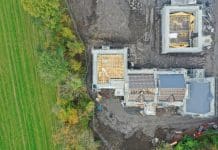Stephen Stone, non-exec director and board member of ilke Homes, explores why new building regulations, on-going issues around build quality and a chronic lack of skilled labour mean housebuilding will now be forced to innovate
Housebuilding methods in the UK have remained largely unchanged for decades now. However, tighter and greener building regulations, continuing issues surrounding build quality and a lingering lack of skilled labour means that the industry is now being forced to innovate – and rightly so.
The term ‘modern methods of construction (MMC)’ has been bandied around the construction and housebuilding industries for some time now, but it has only been in the last six to seven years or so that stakeholders have begun to consider them a game-changer.
The market share of volume housebuilders has almost doubled from 31% in 2008 to 59% in 2015, according to a parliamentary report, as smaller firms – beset by tighter lending criteria, planning delays and lack of resources – went out of business. But while some have been more forward-thinking than others – for example Crest Nicholson said back in 2018 that it hoped to build around 15% of its homes using offsite manufacturing (OSM) by 2020 – others still continue to deploy the same methods to build homes used almost 100 years ago.
However, change is on the horizon, and whether it is forced on housebuilders or they embrace it, a step-change is certainly happening.
Change is on the horizon
I recently joined the board of ilke Homes, the UK’s leading modular housing company that has grown its order book to well over 1,000 homes. What drew me to the company I hear you ask? It was the team’s dedication to creating a genuinely positive impact on the environment and communities it operates in.
The construction industry, as we are all aware of by now, is one of the UK’s biggest emitters of carbon – responsible for 40% of our nation’s total. Meanwhile, the operational emissions from the UK’s housing stock stands at around 20% of the UK’s total, according to the Committee on Climate Change.
Offsite manufacturers who deploy precision-engineering techniques along production lines in factories to deliver high-quality, energy-efficient housing, are well placed to offer a solution to this.
In February, the government announced its long-awaited decision on the Future Homes Standard. As part of new building regulations, all new-build homes constructed from next year onwards will be expected to produce 31% lower carbon emissions. New homes will also be required to have “low-carbon heating” and to be “zero carbon ready” by 2025, the Ministry for Housing said.
Cash-strapped councils and housing associations (HAs), who have suffered from cuts in central Government funding and a lack of skilled resource, may struggle to meet these targets – this is where modular housing can step in.
Improving build quality and overcoming skills shortages
Another issue that plagues the housebuilding industry is quality. While some mistakes are to be expected in a product as complex as a home, 97% of buyers reported snagging problems or defects to their builder last year, according to the 2020 national new home customer satisfaction survey.
In an age where technology is helping transform industries beyond recognition – such as car manufacturing and aviation – it’s time for housebuilding to have its day of reckoning. By using precision-engineering techniques that are more similar to Formula 1 than housebuilding, we, at ilke Homes, are able to deliver homes that are free of snagging issues.
Lastly is the skills crisis that has been decades in the making. The rate of retirement in construction looks set to increase as 22% of the workforce are over 50, and 15% in their 60s. Compounding this issue is the fact that less and less young workers choose construction as a career path, while the new post-Brexit ‘skills-based’ immigration system threatens to reduce the industry’s access to talent from the Bloc.
OSM doesn’t draw from the same talent pool as construction. Therefore, it has the ability to ramp up housing delivery without placing an extra burden on skills availability. In addition, unlike a traditional construction site where young workers learn a specific trade – e.g. carpentry or plumbing – OSM provides a worker with transferable skills, such as in digital design and operating complex machinery, that can be used in other manufacturing arenas – such as car manufacturing.
If we’re going to tackle the problems posed by new building regulations, poor build quality and the skills crisis, then a step change in how we build homes is needed. While not the whole solution, factory-built housing can bring much-needed additionality to the market.














